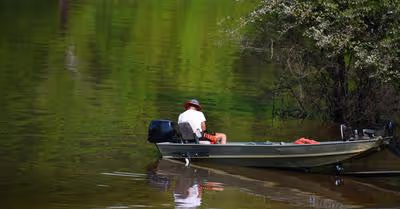
Key Takeaways
- Averagely, your vessel will need 5 HP per 2,200 pounds (1,000 kg) of its weight.
- However, you shouldn’t use more than 75% to 80% of the maximum horsepower.
- Lastly, consider the size and type of boating activities you plan to do with your boat.
- If you're into water sports, get a more powerful motor to pull skiers or wakeboarders.
- If you're just using your boat for leisurely cruising, a smaller motor may suffice.
Are you planning on buying a 16-foot boat and wondering what size outboard motor you need? I’m here to help choose the right outboard motor.
The size of the outboard motor for your 16-foot boat depends on several factors, including the boat's weight, the number of passengers, and the type of water you navigate. However, a general rule of thumb is that a 16-foot boat requires a motor with at least 40 outboard boat horsepower capacity.
Having spent many years boating and testing different types of boats and motors, I understand the importance of selecting the right motor size for your boat and the impact it has on your boating experience. I’ll take you through everything you need to know about selecting the appropriate outboard motor for your 16-foot boat.
What Size Outboard Motor Do I Need For A 16-Foot Boat?
If you own a 16-foot boat, you'll need an outboard motor that can provide adequate power to move it through the water. But what size outboard for 16-foot boat is ideal?
The ideal motor size for a 16-foot boat is usually between 40 and 50 horsepower (HP). A motor of this size will provide enough power to move your boat through the water at a reasonable speed while still being fuel-efficient.
It's important to note that the size of your boat and its weight will also play a crucial role in determining the appropriate motor size.
A 16-foot boat is typically used for recreational activities such as fishing, water skiing, and cruising. It's a popular size for small families or groups of friends who want to enjoy a day out on the water without breaking the bank.
Note that it's important to consult your boat manufacturer's recommendations and ensure that you choose a motor that is appropriate for your specific boat model.
Understanding Boat and Motor Size
When it comes to buying the right outboard motor for a 16-foot boat, understanding the relationship between boat size and the size motor is crucial. Here are some key things to consider:
Boat Size and Weight
The size and weight of your boat are important in selecting an outboard motor. A heavier boat will require a more powerful motor to move it through the water.
As a general rule, you should aim for an outboard motor with at least 5 horsepower (HP) per 2,200 pounds of weight. That said, a 16-foot aluminum boat is more lightweight than a 16-foot fiberglass boat, so you might need a less motor size rather than an oversized engine to ensure an efficient ride.
Motor Size and Weight
The size and weight of your outboard motor will also affect your boat's performance. A larger motor will provide more power but will also be heavier and more difficult to maneuver.
Conversely, a smaller motor will be lighter and easier to handle but may not provide enough power to move your boat through the water efficiently. For that reason, it’s important for boat owners to consult with a professional for the right motor size based on their boat use.
Boat Length and Motor Size
The length of your boat is another crucial factor to keep in mind when getting an outboard motor. A longer boat will require a more powerful motor to achieve the same level of performance as a shorter boat.
Here's a quick reference guide to help you determine the appropriate motor size based on your boat's length:
Remember, these are just general guidelines. Your specific needs may vary depending on the weight and design of your boat, as well as your intended use.
Note that other factors, such as the total weight of the boat, the intended use, and the hull design, can also impact the recommended outboard motor size. Also, you want a sustainable motor that can handle the waters you intend to maneuver, whether a small lake or an open sea.
It's always a good idea to consult with a boating expert or refer to your boat's manufacturer recommendations to ensure you select the right outboard motor for your needs.
How to Determine Outboard Motor Size
When it comes to determining the right motor size for your 16-foot boat, here are a few ways you can determine your right outboard motor:
Calculating Based on Boat Weight
One way to determine the right outboard motor size for your boat is to calculate it based on the boat's weight. You can find the weight of your boat in the owner's manual or by checking the manufacturer's website.
Once you have the weight of the boat, you can use a calculator to determine the recommended motor size.
There are many calculators available online that can help you with this. For example, the Maximum Boat Horsepower Calculator on Boating Hub uses the computational method to determine the largest engine allowable for your boat based on its dimensions.
Considering Passenger Weight
Another factor to consider when choosing an outboard motor size is the weight capacity of your passengers. If you plan to carry a lot of passengers, you’ll need a larger motor to compensate for the extra weight.
To determine the right motor size based on passenger weight, you can use a simple rule of thumb. For every 150 pounds of passenger weight, you’ll need an additional 10 horsepower. So, if you plan to carry 600 pounds of passengers, you’ll need a motor with at least 40 horsepower.
Outboard Motor Size and Boat Length
As stated earlier, there’s a recommended outboard motor size for boats of different lengths. Keep in mind that that’s just a general guide, and you should always consult your boat's owner's manual or the manufacturer's website for specific recommendations.
Additional Features to Consider When Getting Your Boat's Motor
When choosing an outboard motor for your 16-foot boat, there are a few additional features to consider beyond just the size of the motor.
Power-to-Weight Ratio
The power-to-weight ratio refers to the amount of power your motor can generate in relation to the weight of your boat and its contents. A higher power-to-weight ratio means your boat will be able to move faster and more efficiently through the water.
The power-to-weight ratio is calculated by dividing the horsepower of your motor by the weight of your boat and its contents. For example, if you have a 16-foot boat that weighs 1,500 pounds and you want to use a 50-horsepower motor, your power-to-weight ratio would be 0.033 (50/1500).
A higher power-to-weight ratio means your boat will be able to move faster and more efficiently through the water. This is because the motor has more power to move the boat forward, and the boat is lighter, so there is less resistance in the water.
Speed and Performance
Speed and performance are also crucial factors to consider when you’re choosing an outboard motor for your boat. The right motor will allow your boat to reach its optimal speed and maintain it efficiently.
A motor with the right amount of horsepower will allow your boat to plane quickly and efficiently, which translates to better overall performance and speed. In fact, it will also ensure fuel efficiency.
Shaft Length and Engine Mount
The length of your shaft should also be appropriate for the depth of the water you will be boating in. If the shaft is too short, the propeller may not be fully submerged, which can cause cavitation and reduce performance. On the other hand, if the shaft is too long, it can create drag and slow down the boat.
The engine mount is also important to consider. A transom mount is the most common type and is suitable for most boats. However, if your boat has a high transom, a clamp-on mount may be necessary.
Passenger Capacity
You also want to consider your boat’s capacity plate and ensure that you don’t exceed the stated maximum capacity. The capacity plate indicates the max weight capacity and how many passengers your boat can safely carry.
Whether it’s the number of people or the maximum weight, overloading your boat’s capacity can cause it to become unstable and increase the risk of capsizing.
Gear and Equipment Weight
The weight of your gear and equipment should also be factored in when selecting an outboard motor. For example, if you plan on carrying a lot of gear on your fishing boat or towing water skiers or wakeboarders, a larger motor may be necessary to maintain speed and performance.
Environmental Conditions
Finally, environmental conditions such as tides, currents, and wind should be taken into account when selecting an outboard motor. A more powerful motor may be necessary to navigate through rough waters or against strong currents.


